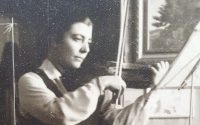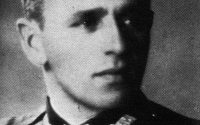Lviv: The Lion City
Lviv, as it is called today was founded by Leo the eldest son of King Daniel of Ruthenia around 1240. it was absorbed into the Kingdom of Poland in 1349 as Lwów and remained so until 1772 when it was absorbed by the Austrian Empire and the name changed to Lemberg. In 1918, with the re-establishment of the Polish Republic it changed back to Lwów, which lasted less than thirty years, when the city was re-named Lvov in Russian as it was incorporated into the USSR. It became Lviv in 1991 on the creation of the Republic of Ukraine the Latin name is Leopolis which means the Lion City. I will refer to the city using its name at the particular time I am referring in the course of this blog. https://en.wikipedia.org/wiki/Lviv
Regardless of whether a civil war in Ukraine was in full swing or not, at the end of April 2014 I made up my mind to go to Lviv. Through the Galicia group, I had made contact with Ihor Holyboroda, who offered to help with any background information. He was intrigued to learn that my grandfather had arrived in Lviv in 1912, (it was called Lemberg then, an important city of the Austro-Hungarian Empire and official capital of the province known as the Kingdom of Galicia and Lodomeria) to study architecture at the Polytechnic. I only ever asked myself why Lemberg/Lwów/Lviv, this year, 2019, on a visit to Vienna, which will appear in a future blog in which I will attempt to answer that question. The next part of my grandfather’s life is somewhat obscure. He joined a paramilitary organisation in Lemberg known as the Rifleman’s Association and from there to an army officers’ training school in Stanislau as it was called in 1912 (Stanislawów in Polish now known as Ivano-Frankivsk as it is now in Ukraine.) My hope was for Ihor to expand on this.
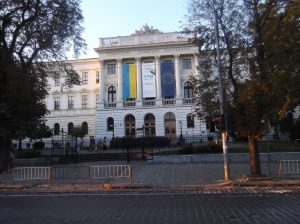
The notion turned to reality when I booked the flight from London to Lviv via Warsaw, which in turn prompted me to make enquires to the Polish Consulate in Edinburgh, regarding confirmation of citizenship for myself, as I needed to know what documentary evidence I might need in the event that my father’s birth certificate was lost. The paperwork which I downloaded ran to twelve pages plus a personal testimony. It resembled a university dissertation and I would need help of a Polish speaker. A friend, Anna Miszarz helped out. Anna was also able to help locate my grandfather’s grave in Wałcz in western Poland. More of this in a later post. In the few weeks before my arrival in Lviv, I discovered that Armenians had settled in Lviv since the 15th century, so my father’s Armenian ancestry is long established in Poland and then Ihor emailed information about the infantry regiment my grandfather served in during WW1. It was known as the General Schoedler Regiment and was established in 1725.
Matthew Zajac, a Scottish writer and actor wrote a book entitled ‘The Tailor of Inverness’, which was later written as a play and performed internationally to outstanding reviews. My sister lent me the book and it’s content was mind-numbing for me. His father, like mine was a Polish exile whose home town was also in eastern Poland, occupied in 1939 by the USSR. Matthew Zajac, like me was eager to learn of his father’s past and it led to some unforeseen and shocking discoveries. For me his research in Lviv put me on a parallel course with Matthew. Please do read the book. I would thoroughly recommend it.
The remainder of this blog is in diary form in which I describe my visit to Lviv
15.09.2014
It’s 4.10 in the morning and a thought occurs to me – this might be my last day on British soil as a British citizen. Strange to think that technically I could be foreigner next Friday when I land in rUK, as the Scottish Referendum on Independence takes place on the 18th.
It is not until I land at Lviv that I realise I’m in a completely new country which no one I know has ever visited. The short stop-over in Warsaw – well I could have been anywhere; it was all the same down to ciabatta with mozzarella and sun blushed tomatoes, heated up of course, and latte. English spoken everywhere. Why do we British seem to find difficulty with foreign languages?
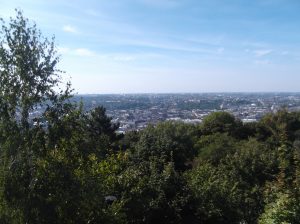
Lviv airport is small – no chance of ever getting lost here and for the first time I set foot in Ukraine. No fuss at the border and my passport stamped.Good to see Lviv now before too many western tourists discover it. Yuri, the manager of the Chopin hotel collects me at the airport. The best thing I can say about driving here is that is a bit informal. I have to take deep breath as Yuri manouevres the car between two other cars where we just miss their wing mirrors.
An amazing array of churches – God only knows how many denominations there are here; and giant crucifixes. I’d say that the Bolshevik’s attempts to eradicate religion failed spectacularly. I imagine in the current political situation here, religion gives solace. The Ukrainians appear not to have reached a post-Christian point – yet. There appears to remain a place for the old values.Yuri tells me that Ukrainians regard us in the in the west as value-free.
One of the main squares Svoboda Square has a giant statue of Lenin, or so I thought, and this was a huge mistake when I pass comment to Yuri and the hotel staff. I’m told it is not Lenin Taras Shevckenko, Ukraine’s national poet. Oops! Lesson learned; not all statues depicting a man with a beard, outstretched hand and long coat are of Lenin. On the other hand there is also a statue dedicated to the celebrated Polish poet Adam Mickiewicz
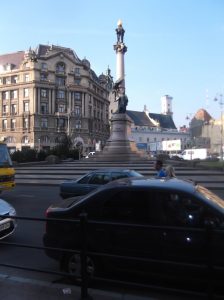

My first Ukrainian meal – vegetable salad, followed by trout, cheesecake, mineral water and an espresso costs under £12.00.
16.09.2014
Lviv pancakes with cottage cheese and raisins topped with chocolate sounds interesting and it is another first. I may take a mini church tour after breakfast. The Armenian Cathedral seems to be not far from the hotel. I doubt if I’ll find a small stein with the Polish colours on it but I’ll try. The only colours around here are the blue and yellow of Ukraine. It might be so much easier if one day Ukrainian was to adopt the Latin alphabet but, thankfully, some of the street signs are in the Latin alphabet. This helps to make Lviv and Ukraine in general so much of an unknown.
Well; Lviv pancakes certainly beat the offerings from Weatherspoons, although I thought the latter great at the time. Tomorrow I’ll something else at breakfast. Having seen what the Ukrainians can stack away, so much so for the myth of the British breakfast, although they do not have the same grease-ridden offerings that we seem to have.
This is the farthest off the beaten track I’ve ever been on my own. There are no British, Germans, French, Dutch, Italians, Spanish, Americans, Japanese or Chinese – at least none I’ve met. There are Polish tourists, which is understandable. Traffic is chaotic, signage arbitrary, no yellow lines, or any lines for that matter. Hire a car here at your peril unless you’re an aficionado of extreme sports. It seems that the city always was paved with cobblestones until the Russians arrived in 1945 and tore them up for some monument or other, replacing them with asphalt. Since independence the Ukrainians have put the process into reverse.
Life here seems to flow it just happens as it’s not been commidified – yet! The people are elegantly turned out and they are a handsome people these Ukrainians – those from Lviv in any case. In the days of the USSR we lumped them all together as Russian – how wrong was that, we Scots should have known better. They look totally different from we were wrongly told was the archetypal Russian. Lviv Ukrainians are 100% so; no Russians here except for the ones who have opted to be Ukrainian.
Ihor has not been able to find any information regarding my father’s birth certificate but what I have learned is that even if the Moszoros had been Armenian Church, my father might still have been baptised Roman Catholic, the denomination of his father. More so as Edward was a serving army officer. Ihor’s hunch is that unless documentation from that period had been moved elsewhere, it will not be in Lviv. The Red Army destroyed everything in its push westward during WW2. As a suggestion the birth certificate might be in Wroclaw, where the Lviv Poles were deported after WW2. One piece of information he gave me was that the Hungarians who came to Lviv in the 16th century were Lutherans, escaping the Counter-Reformation in Austria. So the Armenian-Hungarian side of my genealogy is Armenian Catholic and Lutheran.
It’s incredible the number of people here who are aware of the Scottish Independence Referendum.
A famous building here, the Scottish Café is now the Atlas Hotel, having regenerated from the original café to a bar then a bank and now a very upmarket hotel on Shevchenko Prospect 27. The original café was a meeting place for mathematicians from all over the world. A renowned Polish mathematician, Stefan Banach began a book, in the 1930’s, ‘The Scottish Book’ where mathematical problems were posed and invitations to solve them opened. The proprietor of the café would offer a reward to the successful mathematician. I asked to see the book and sure enough, mathematicians worldwide had made contributions.
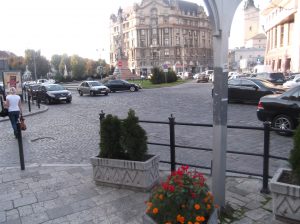
17.09.2014
I have not come here solely with the intention of finding answers; more to gain an impression of the environment my father would have experienced. I have an understanding – but answers? – no. the Bolshevik NKVD and Nazi SS between them destroyed all that in their ideological zeal. Why go to the bother of destroying lives, but records to? Why obliterate any trace that people ever existed? It has cemented my now profound mistrust of ideology, narrow nationalism and dogmatic religion.
That’s about all I can do – the birth certificate is not here in Lviv but I had no great expectations that it might be. It was an outside chance – no more. It’s almost certain that there were many more Moszoros besides my grandmother who were deported to Siberia as ‘undesirables or counter-revolutionaries.’ after the war, as Poles, they were deported to Wroclaw and other previously German territories. There is a remote possibility that my father’s birth certificate might be held in Armenian church records (he would then be classified as Armenian) but if so I have been advised to contact the Polish authorities to establish if this would present a problem in my application for confirmation of Polish citizenship. The search now moves to Wroclaw.
St. Georges Ukrainian Catholic Cathedral, the Scottish Café and now on to Lychakivske Cemetery which is huge and with massive sarcophagi and as I previously mentioned bears testament to Lviv’s past. I am especially interested in the monuments to the Ukrainians and Poles who fought in the Polish-Bolshevik War 1918-1920 and there are thousands of commemorative crosses. For a moment I think about searching for any that might bear the name ‘Pach’ or ‘Moszoro’ and begin walking in a circular route they are set out. The Bolsheviks desecrated the place and turned it into a Soviet War Cemetery but is has been restored by the Ukrainians with Polish help especially with the monument to the Young Eaglets of Lwów. No wonder the Poles get so uptight at the Russians trying to erase all evidence of this from history, as with the murdered Polish officers at Katyn. One very moving thing – a party of German tourists come to pay their respects – another small step on the road to full reconciliation.
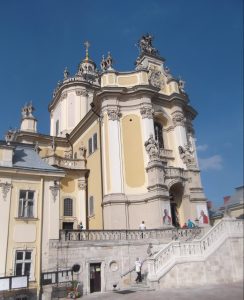
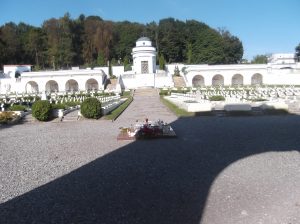
18.09.2014
I have continued with Matthew Zajac’s book. It’s uncanny the parallels in our lives and now in 2003 (book time) he has reached Lviv. According to his description then, the city has now advanced leaps and bounds (trams, buses and trolley buses notwithstanding). New, western cars overwhelm the streets although you can find some class battered Moskvich or Lada and the trolley buses look as they have been used as dodgem cars. It’s good to see people have choice, as long as they do not swallow our western narrative unconditionally. There might be opportunities here in the future. Their experiences in the Soviet system and black market prepared them well for striking bargains.
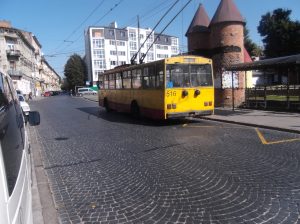
This is my last full day here. The Scottish Referendum is under way now. I am Scottish with firm Galician and Armenian roots (the latter I knew I had, but not as much as there appears to be in reality) besides German, Prussian and Hungarian,. Walking along the streets of Lviv, I feel I’ve been here before as I’ve not got lost once. I would love to go home to Scotland and then make regular trips here – to feel at home in both places.
It’s 1300 and I’m in a café converted from the original Post Office in Druskavska Street. Home made pies from scratch and I choose banana and strawberry flavour – delicious. I should try to find a book, in English, on the History of Lviv. I’ll have to call it by the name it had depending in which country it was at the time be it Lwów, Lviv, Lemberg, Leopolis, Lvov.
Another long tramp around the old city and now I’m having out of it to areas which look less affluence with people trying to make a living selling goods out of lock-up garages and what looks like storage huts. This will all be swept away once Ukraine is integrated in the EU. For the first time I appreciate recent history, not just of the German occupation but the Soviet one too – and I understand why there is such an upsurge in Ukrainian nationalism. I don’t necessarily agree with it as very often well-meaning nationalist sentiment becomes hijacked by extremist elements. Such happened during WW2. What people in Britain do not know I, the concentration camps aside, that in this part of Ukraine some of the worst atrocities were committed against Jews and Poles, spurred on by Stepan Bandera, https://en.wikipedia.org/wiki/Stepan_Bandera head of the Ukrainian Independence Movement. In the occupied territories the Nazis would sometimes hire local thugs to carry out atrocities. There is a street named after Stepan Bandera and this makes Jews and Poles alike bristle.
I want to see the Jewish synagogue to pay my respects – it’s not there. A cold feeling has just run through me of all these people in the ovens at Belzec and Auschwitz. I find a corner to contemplate.

The narrative here runs like this Russian = Bolshevik = Jew. That’s been the experience of Ukrainians so lets hope the future changes that. Bolshevism shafted Karl Marx.
I set out for an evening meal and decide to go to one of the bistros on Plosha Rynok. The square is buzzing with people, musicians, street artists and performers and a 4m tall panda, or at least someone dressed up, people dining and drinking. Market stalls with all manner of food and drink surround the inner perimeter in front of the restaurants and cafés and so I decide to eat my way round the stalls; the highlight is a strudel that looks like black bun except it has a pear and cherry filing and it’s topped off with vanilla sauce – wunderbar! Who would ever go back to the Belfast continental market after this?
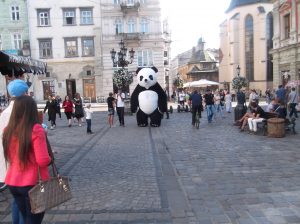
This is my last full day in Lviv this visit. I think one day soon the city will revive it’s multi-national heritage. The Poles have returned as visitors, soon they will be followed by the Germans, Austrians, Scandinavians, Americans and Japanese. I hope the British will visit too but not I hope the stag and hen party brigade descending, like modern day versions of Genghis Khan, out of Wizz, Ryanair and Easyjet budget flights, looking for chips, Guinness, WKD, Irish bars and festooning the city in vomit.
I’m not hopeful that there will ever be a meaningful Jewish community again or at least for a long time. Too many bad memories have to fade first and the racial dimension might always lurk in the background because the Ukrainians have always regarded Bolshevism as a Jewish creation – sad.
19.09.2014
I’m still British – well for the time being anyway. What’s most poignant about Lviv, for me, is not what’s here but what’s not here. No Moszoros, no Pachs and no Jews and all this happened less than one hundred years ago. Ah well, maybe that’s the best euphemism; avoiding justifiable emotion and hurt – that they were just passing through. Just good citizens Lviv has seen come and go. This would be understandable if lessons for all time were learned. Thankfully the city survived and its current occupants do it proud and that’s the way it should be. It’s come out of hiding and shaken off the dust of Nazism and Bolshevism. I pray that it does not become enthralled to the free-market which would do greater lasting psychological damage than those two brutish ideologies would ever hope to perpetrate.
At the Arsenal museum and I’m amazed to see a Scottish broadsword exhibited.
I never understood,until now, why my father never referred to his grandfather as Polish but Armenian. In the days of the Austro-Hungarian empire where parents were of mixed nationality; boys took the father’s nationality and girls the mother’s. So Mikal Moszoro’s wife Anna Hamerling must have been Polish for my grandmother to be Polish. If she had a brother he would have been Armenian. But who was the Prussian Anna von Podbielska? Was Mikal previously married and was widowed? This is similar to a physics problem – the answer to one theory raises questions about something else. I may never find any genealogical theory of everything but I’m beginning to understand the mathematics.
The final day and I still have a few UAH (the hryvna Ukrainian currency)left to buy lunch and if there is time go back to the market for some of that delicious strudel – both accomplished. Not far from the Arsenal museum is the site where the main synagogue used to be. Work is under way to build a memorial to the lost Jews of Lviv. I believe that Lviv will slowly recover its multi-national roots and I hope the old prejudices will be left behind. No matter what the Nazis and Bolsheviks tried to do, Lviv’s soul is multi-national.
End
